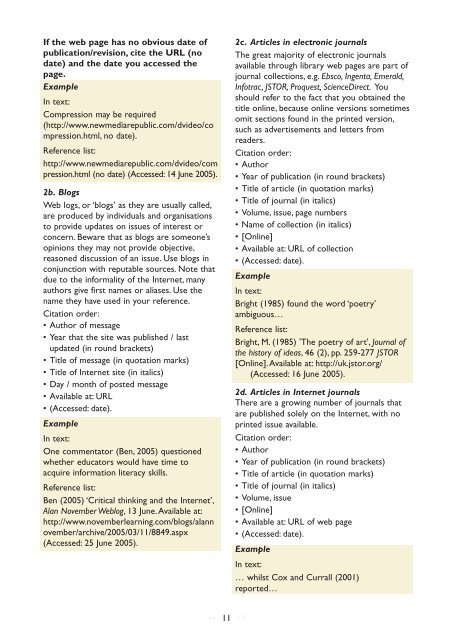Cite them right:
You also want an ePaper? Increase the reach of your titles
YUMPU automatically turns print PDFs into web optimized ePapers that Google loves.
If the web page has no obvious date of<br />
publication/revision, cite the URL (no<br />
date) and the date you accessed the<br />
page.<br />
Example<br />
In text:<br />
Compression may be required<br />
(http://www.newmediarepublic.com/dvideo/co<br />
mpression.html, no date).<br />
Reference list:<br />
http://www.newmediarepublic.com/dvideo/com<br />
pression.html (no date) (Accessed: 14 June 2005).<br />
2b. Blogs<br />
Web logs, or ‘blogs’ as they are usually called,<br />
are produced by individuals and organisations<br />
to provide updates on issues of interest or<br />
concern. Beware that as blogs are someone’s<br />
opinions they may not provide objective,<br />
reasoned discussion of an issue. Use blogs in<br />
conjunction with reputable sources. Note that<br />
due to the informality of the Internet, many<br />
authors give first names or aliases. Use the<br />
name they have used in your reference.<br />
Citation order:<br />
• Author of message<br />
• Year that the site was published / last<br />
updated (in round brackets)<br />
• Title of message (in quotation marks)<br />
• Title of Internet site (in italics)<br />
• Day / month of posted message<br />
• Available at: URL<br />
• (Accessed: date).<br />
Example<br />
In text:<br />
One commentator (Ben, 2005) questioned<br />
whether educators would have time to<br />
acquire information literacy skills.<br />
Reference list:<br />
Ben (2005) ‘Critical thinking and the Internet’,<br />
Alan November Weblog, 13 June.Available at:<br />
http://www.novemberlearning.com/blogs/alann<br />
ovember/archive/2005/03/11/8849.aspx<br />
(Accessed: 25 June 2005).<br />
2c. Articles in electronic journals<br />
The great majority of electronic journals<br />
available through library web pages are part of<br />
journal collections, e.g. Ebsco, Ingenta, Emerald,<br />
Infotrac, JSTOR, Proquest, ScienceDirect. You<br />
should refer to the fact that you obtained the<br />
title online, because online versions sometimes<br />
omit sections found in the printed version,<br />
such as advertisements and letters from<br />
readers.<br />
Citation order:<br />
• Author<br />
• Year of publication (in round brackets)<br />
• Title of article (in quotation marks)<br />
• Title of journal (in italics)<br />
• Volume, issue, page numbers<br />
• Name of collection (in italics)<br />
• [Online]<br />
• Available at: URL of collection<br />
• (Accessed: date).<br />
Example<br />
In text:<br />
B<strong>right</strong> (1985) found the word ‘poetry’<br />
ambiguous…<br />
Reference list:<br />
B<strong>right</strong>, M. (1985) 'The poetry of art', Journal of<br />
the history of ideas, 46 (2), pp. 259-277 JSTOR<br />
[Online].Available at: http://uk.jstor.org/<br />
(Accessed: 16 June 2005).<br />
2d. Articles in Internet journals<br />
There are a growing number of journals that<br />
are published solely on the Internet, with no<br />
printed issue available.<br />
Citation order:<br />
• Author<br />
• Year of publication (in round brackets)<br />
• Title of article (in quotation marks)<br />
• Title of journal (in italics)<br />
• Volume, issue<br />
• [Online]<br />
• Available at: URL of web page<br />
• (Accessed: date).<br />
Example<br />
In text:<br />
… whilst Cox and Currall (2001)<br />
reported…<br />
‘‘ 11 ’’


